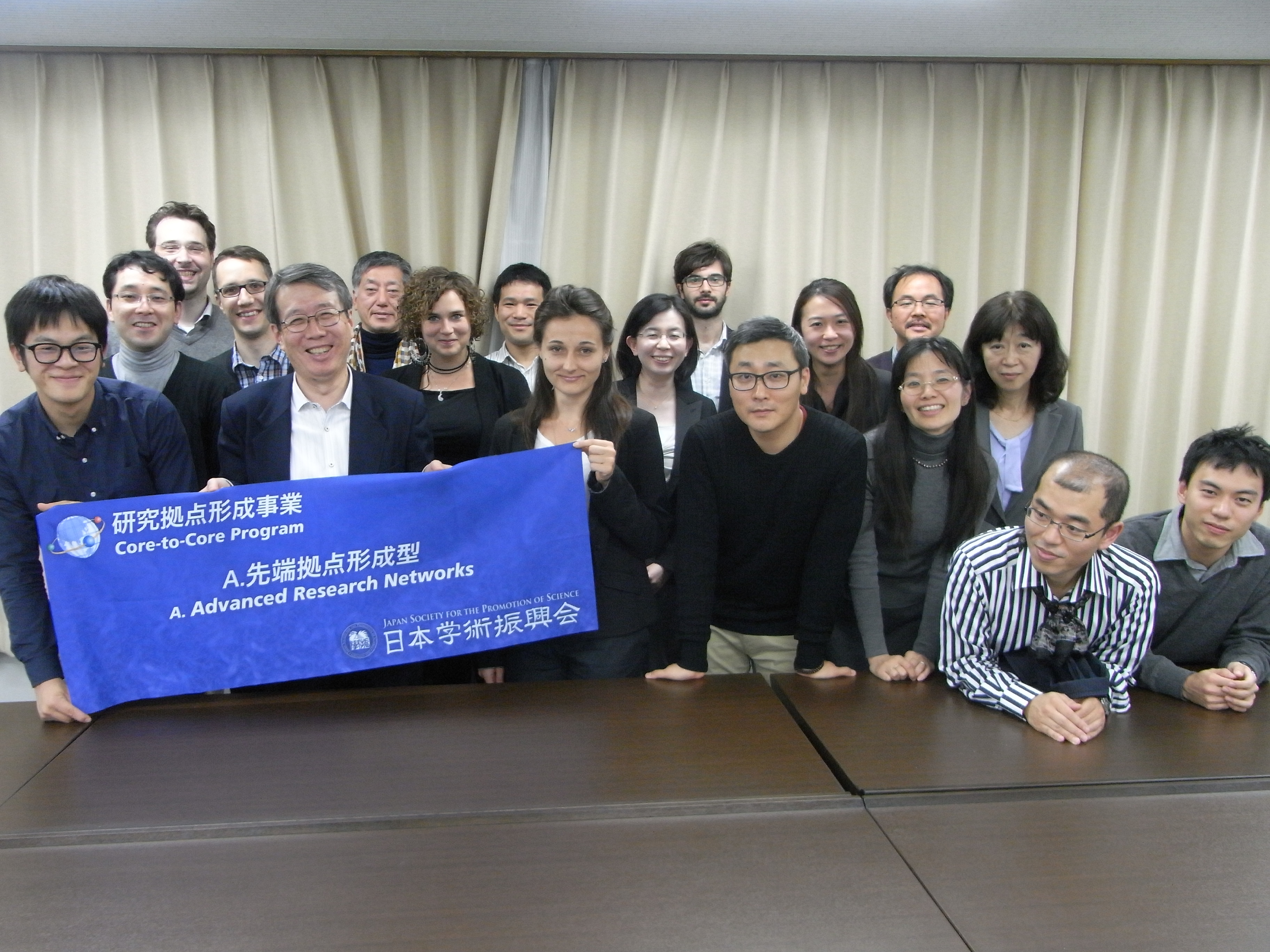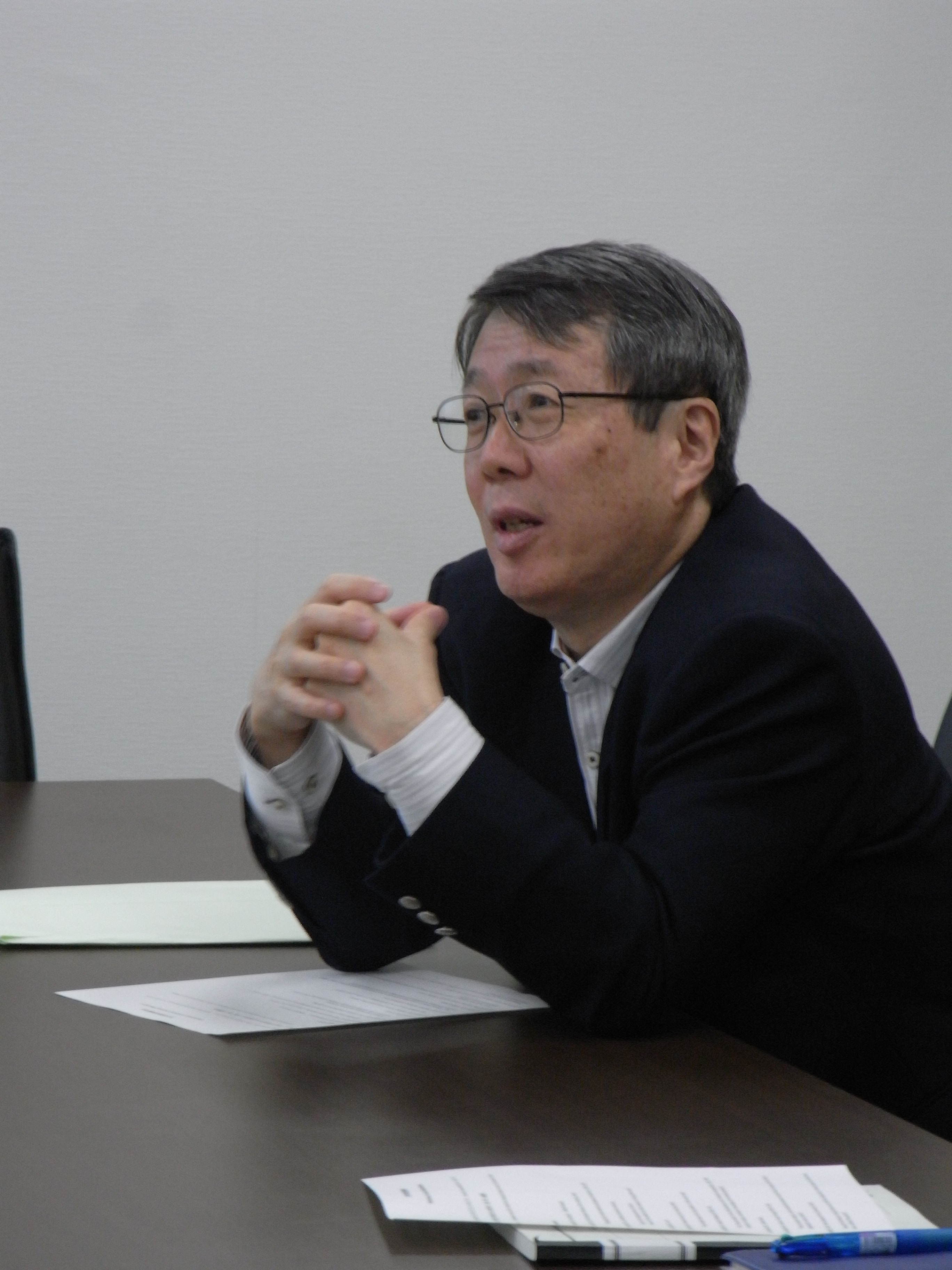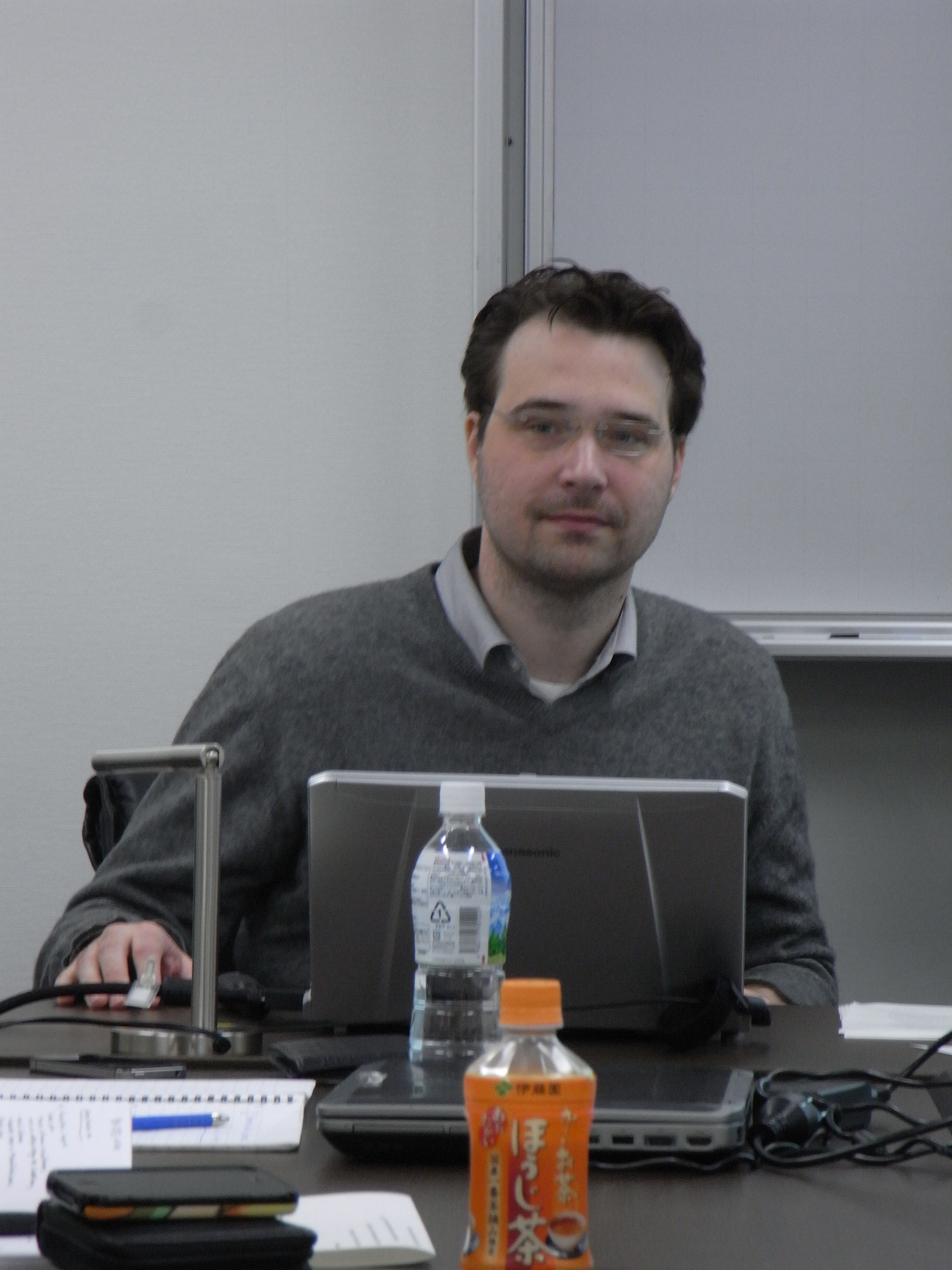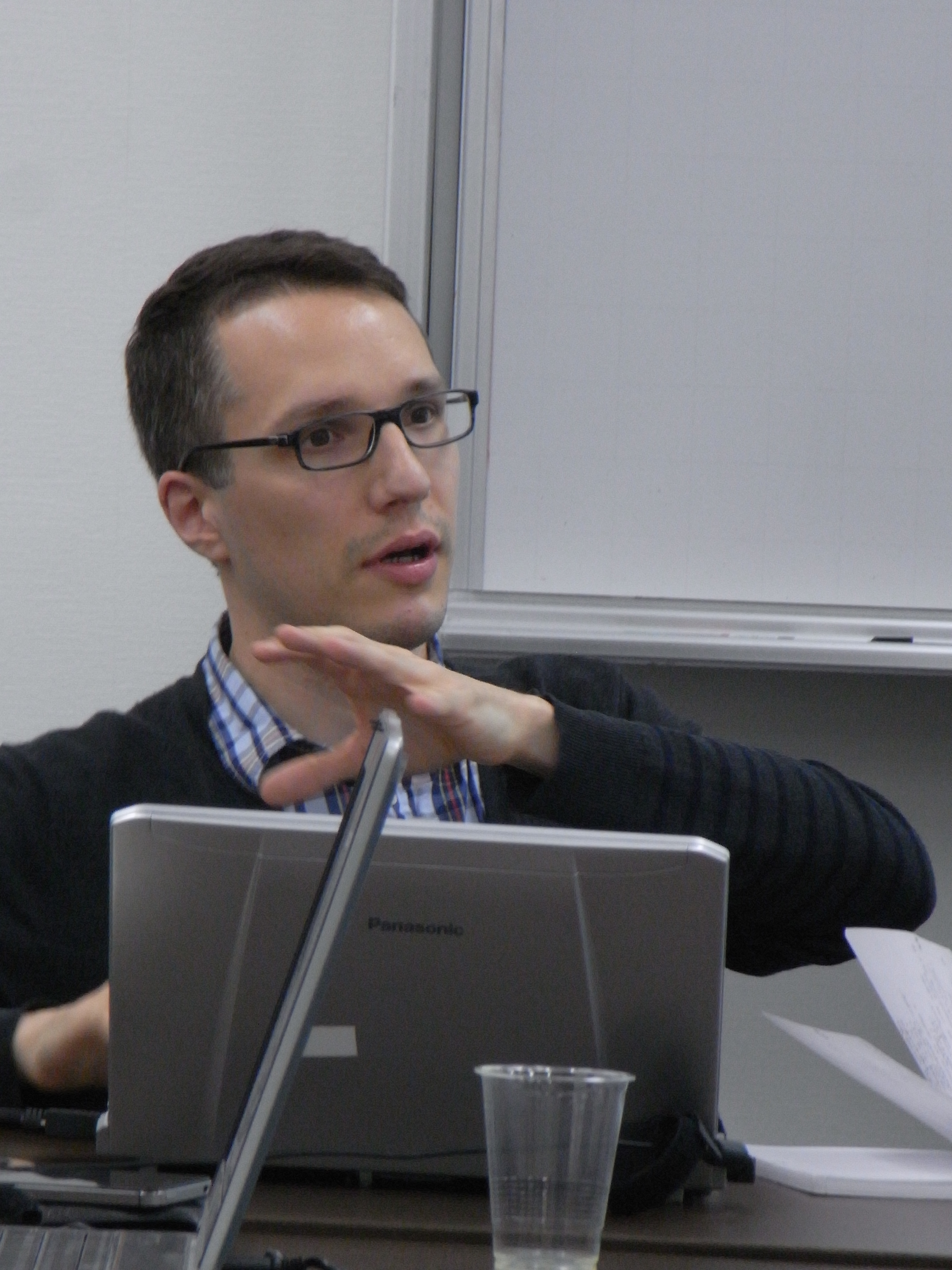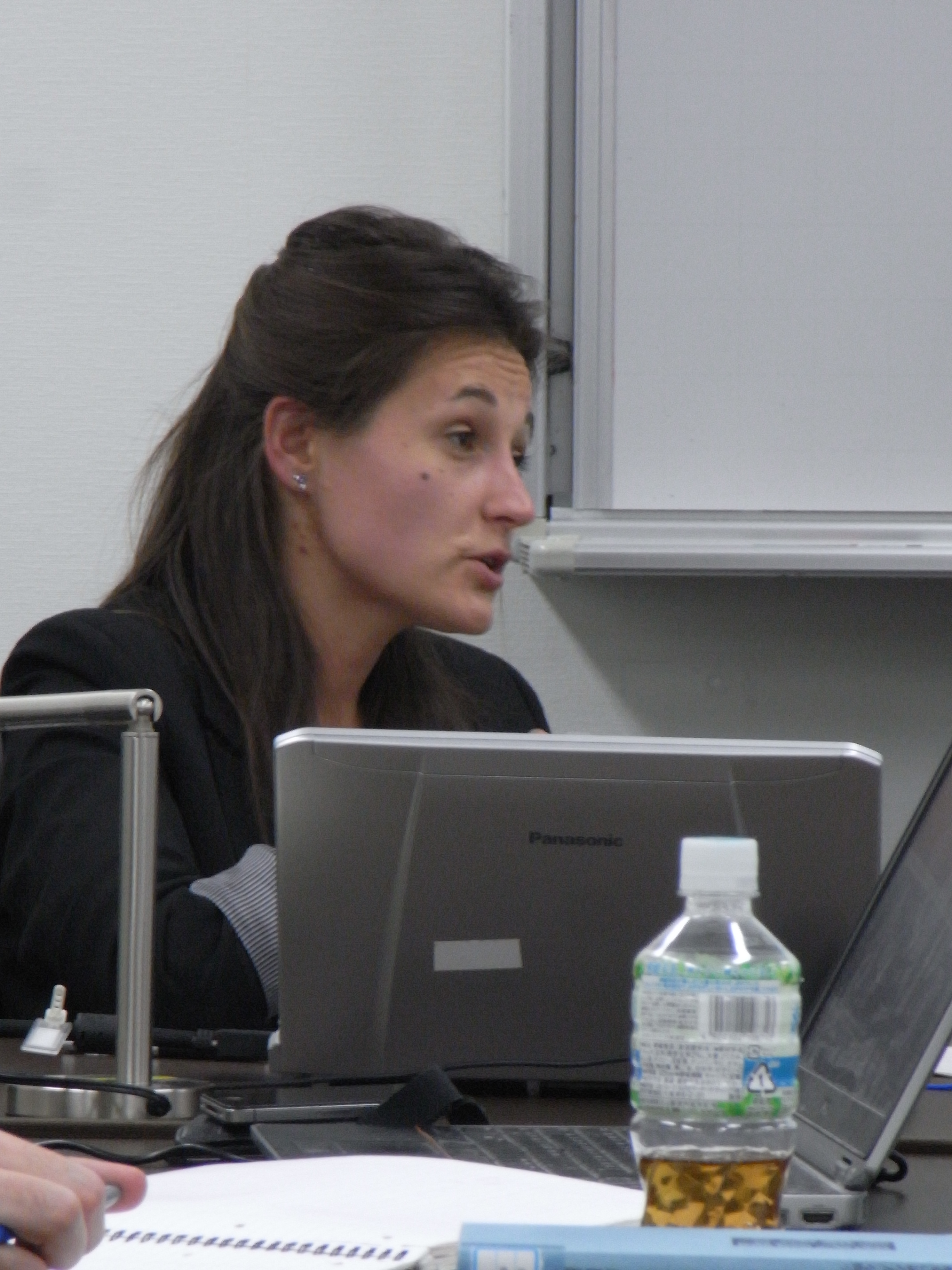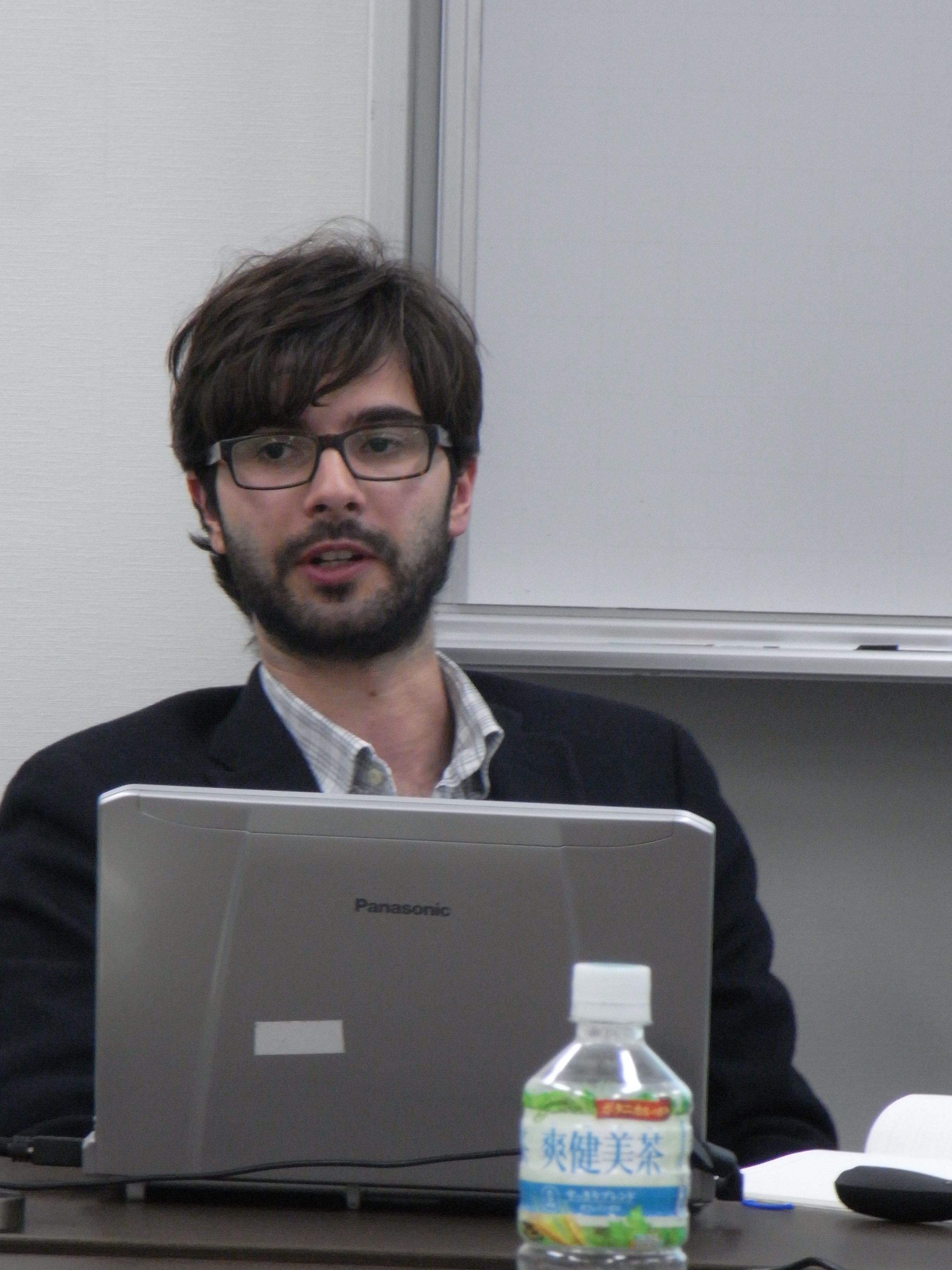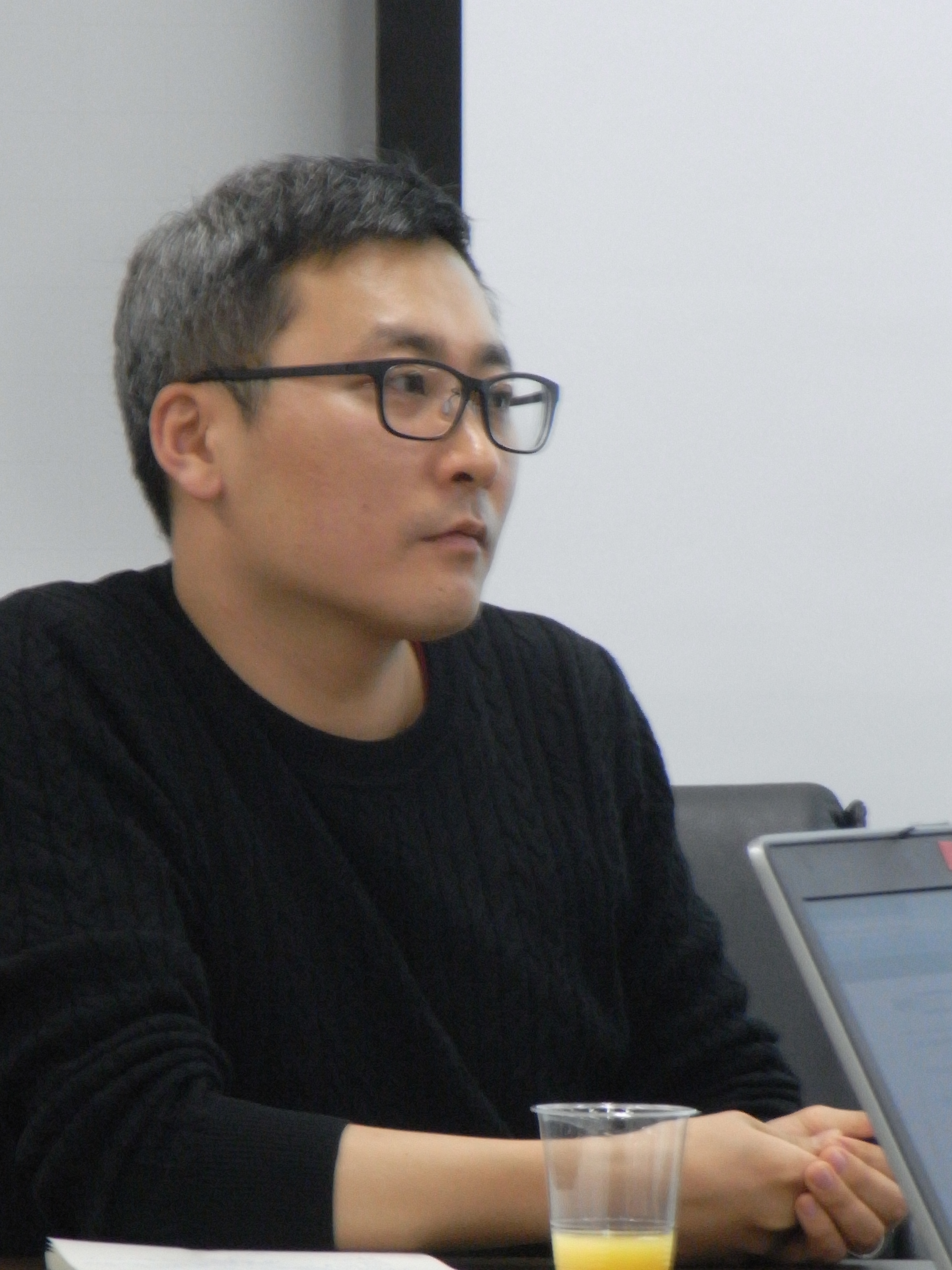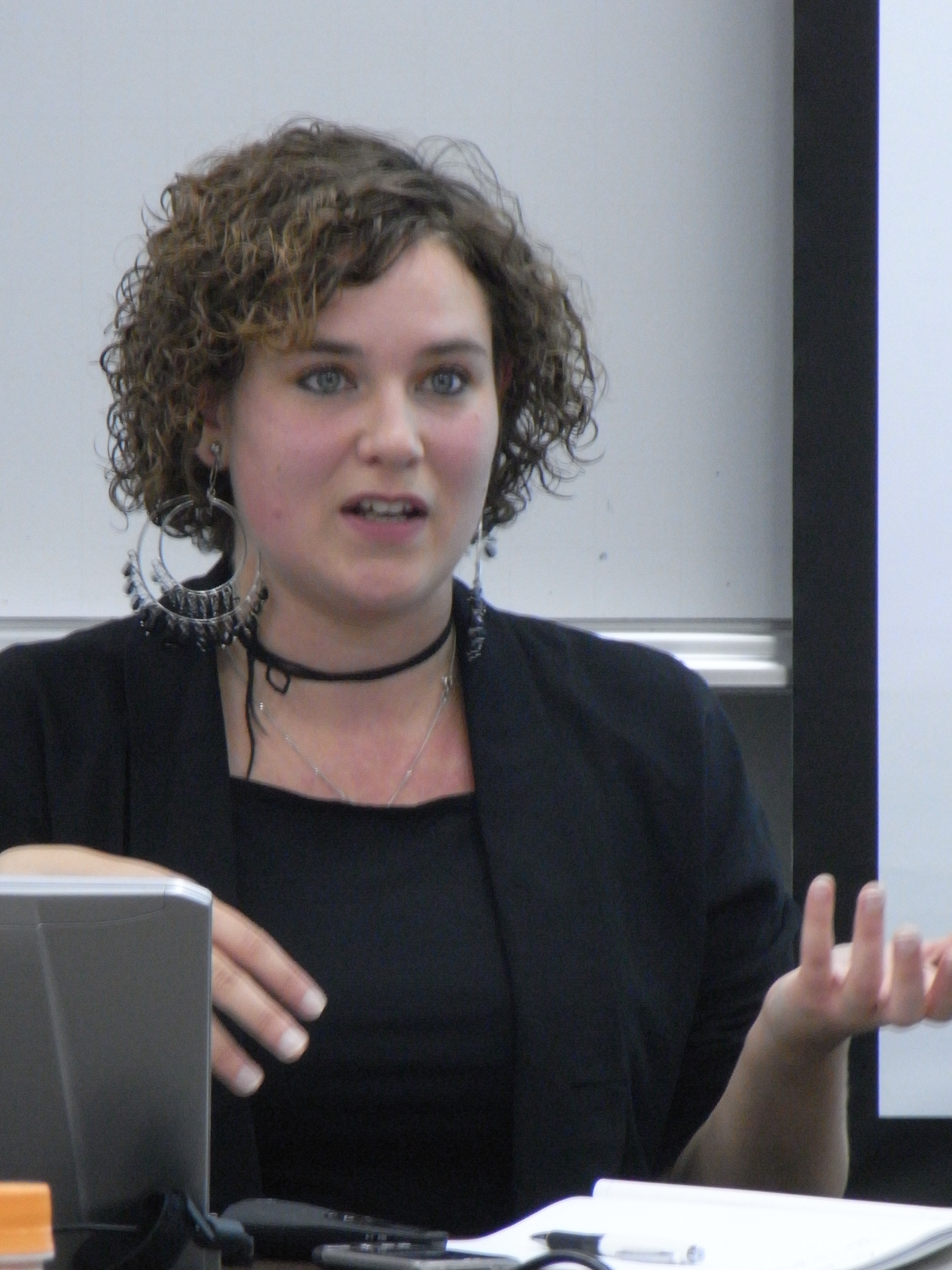2014.11.10
若手研究者報告会 Workshop of Junior/Visiting Members
ベルリン自由大学とパリ社会科学高等研究院の博士候補生数名が、「新しい世界史/グローバル・ヒストリー研究の方法」プロジェクトの訪問研究員として来訪したのを機に、11月8日(土)、若手研究者報告会が開催された。
報告会の冒頭で、このプロジェクトのリーダーである羽田正教授が、プロジェクトの概要を説明し、メンバー一同を訪問研究員たちに紹介した。
報告会では、まずドルフ=アレクサンダー・ノイハウスが、「アジアにおける複雑な結びつき;朝鮮人留学生と日本のプロテスタンティズム、1900-1920年」と題して執筆中の博士論文の概要について報告した。論文の狙いは、明治・大正時代における日本人プロテスタントと朝鮮人留学生の交流が、どのように日本人プロテスタントたちに「アジアン・アイデンティティ」の覚醒を促したかを解明することにある。その際、グローバル・ヒストリーに関する最近の成果に依拠して、教会コミュニティ、YMCA、日本独自の無教会主義といった背景の中で生まれた、プロテスタントの朝鮮人学生と日本人教師たちの数々のネットワークに焦点が当てられている。従来の歴史研究では、日本のプロテスタンティズムと日本の帝国主義拡張のあいだに見られる複雑で相反する力学はほぼ無視されてきた。さらに、従来の研究は、朝鮮の植民地時代の歴史を、日本帝国史を中心に据える歴史叙述の下位に位置づけることが多く、植民地化された側の人々の主体性を検討する余地をほとんど残していなかった。そこで、ノイハウスは、ナショナル・ヒストリー・パラダイムと、帝国史へのトップダウン型のアプローチとを乗り越えることを目指している。さらに彼は、東アジアにおけるプロテスタンティズムの出現は、欧米型の近代化の単なる副産物だとする見方にも疑問を呈する。彼が博士論文で目指しているのは、当事者である朝鮮人と日本人自身に注目することによって、日本とアジア地域とのかかわりについて、ヨーロッパ中心的な近代化モデルを超える、多元的な視点を獲得することである。
二人目の報告者、リサ・ヘルマンは、「広東の租界で暮らす:長きにわたった18世紀におけるスウェーデン東インド会社のケース」と題して報告した。その内容は、1730-1830年の広東とマカオの租界における社会生活をテーマとした自身の博士論文の構想の紹介である。具体例として、彼女は、スウェーデン東インド会社の社員たちと、中国人貿易商および他の外国人たちとの関係に的を絞っている。これらのスウェーデン人たちは仲介人として働いていたが、そのことは、租界という環境がいかに多民族で複雑なものだったかを明らかにしていると同時に、植民地国以外の国の小規模な会社を研究することの必要性もはっきりと示している。ヘルマンは、租界における社会関係を、以下の5つのケーススタディによって検討する。第1は、租界におけるグループ形成とジェンダー関係の分析、第2は、外国人の進出先となった中国の諸地域についての空間的分析、第3は、外国人の日常生活の描写、第4は、スウェーデン人たちが他の国の人々とどのようにコミュニケートしていたのかについての分析、そして第5は、異文化間の信頼がどのように築かれ、失われたかの分析である。これら5つのケーススタディを通じて、彼女は、第1に、この多民族で複雑な環境の歴史的継続性と変容を理解するためには、ジェンダーの視点と階級の視点の両方を組み入れることが必要だということを実証してみせる。そして第2に、広東における力関係がどのように築かれ変容を遂げたのかを分析するためには、長期にわたった18世紀における広東の歴史についての社会的な視点が必要であると説く。
三人目の報告者、ミヒャエル・ファツィウスは、博士論文後のポスドク研究のテーマとして新たに取り組みはじめた「20世紀日本の多様な『近世』」について報告した。この研究の狙いは、近世という時代の特徴、空間性、時間性、そして近世と現在との関係が日本でいかに理解されてきたのかを解き明かすことによって、「近代性」(modernities)についてのさまざまな概念を再検討することにある。報告者はこの研究を、最近のグローバル・ヒストリーにおける「近世性」(early modernities)の概念を巡る論争や、歴史における時間性の描写・表現への関心の高まりと関連するものとして位置づけている。そして過去との学問的、非学問的なかかわり方のあいだにある複雑に入り組んだ力学を究明し、江戸時代を主として国民的な記憶と意識を構築するための宝庫とみなす一般的な見方を乗り越えることを目指している。具体的には、この研究プロジェクトは、以下の4つのテーマを扱うケーススタディによって構成され、これらのケーススタディによって、異なる領域と、時代と、国レベル・帝国レベル・地域レベル・世界レベルというさまざまな空間の交差とを照らし出す:(1)歴史学におけるEarly Modernと近世という概念;(2)日本の観光における朝鮮と台湾の「近世」の表象;(3)社会的な言説における「鎖国」概念の用いられ方;(4)17世紀に日中間の文化的な架け橋の役を担った隱元隆琦と舜水朱に関する展示会。
次の報告者、ナタリア・パシュキーヴァは、アメリカYMCA が19世紀末のサンクトペテルスブルクで展開した「ロシア伝道活動」を扱う自身の博士論文について報告した。この伝道活動は、ロシア帝国時代(1900-1917年)に発展し、1917年の革命後は、主としてアメリカに逃れた亡命ロシア人たちによって担われた。ソヴィエト連邦内での「伝道活動」の継続を目指す試みが繰り返されたものの、実際には成果は上がらなかった。博士論文に向けた彼女の研究の主要な目的は、アメリカYMCAの「国際伝道活動幹事団」と、ロシア側の政界、経済界、知識人界、教会のエリート層との国際的な相互関係を解明することにある。まず、「リーダー」、「組織的伝道活動」、「善良な市民」といった概念を駆使するキリスト教プロテスタンティズムのレトリックにもとづいてYMCAが展開した、「ナショナル」なアメリカ的運動による社会的組織化の1つのモデルについて、詳細に検討する。次いで、主として宗教団体だったアメリカYMCAが、政治的、経済的、社会的、道徳的、そして言うまでもなく精神的な価値観を国境を越えて伝えるために活動する団体へと変質した経緯を追う。そして最後に、YMCAが、本質的には地政学的な目的を推進するために、そしてまた自国の外交政策におけるソフトパワーとして活動するために、どのようにして宗教的な言説を用いたのかについても検討する。この最後の課題に取り組むための1つの重要なフィールドは、YMCAの幹事団とロシア側の伝道活動の担い手たちの協力の上に築かれた、国際的な情報収集・分配のシステムである。
5番目の報告者、アンドレア・トサト・ジョルジオは、18世紀におけるイギリス・東インド会社(EIC)とイギリス国家の関係を検討する自身の博士論文について報告した。EICは2世紀以上にわたって、イギリス経済において重要な位置を占め続けていた存在であり、同社と国家との結び付きは、イギリスの経済および社会内部で、そしてまた大英帝国内で、関連する知的な諸分野がどのように発展したかを探るための、恰好の例となる。論文では、この関係を解明するために、17世紀末の金融改革を中心とする概念的枠組みを構築する。イングランド銀行(BOE)の設立(1694年)は、金融市場の興隆と、公債の性格が変わって恒常的なものとなったことと並んで、名誉革命後のイギリス国家の形成にルーツをもつ特権企業と国家の相互依存を際立たせる出来事だった。国家と「貿易商」とを隔てる細い赤い線は、国家財政の安定が、金融市場における投資家たちの投機的な期待に左右されるようになるにともなって、消滅するように思われる。このような歴史解釈は、植民地主義と大英帝国の発展が、公債維持にとって決定的に重要な意味をもったとする見方とも整合性がある。
最後の報告者、シム・ジェキョムは、戦後の日本と韓国におけるポピュラー音楽の創造・規制と、冷戦というグローバルなコンテキストにおける国家建設と主体性の再構築とを関連付けることを狙った、自身の博士論文の概要について紹介した。ポピュラー音楽をはじめとする大衆文化の創造と規制は、国内産業と国内市場においてナショナリズムの文化的な優位性を確保することだけでなく、国民の情緒・感情の規制と管理、そして国としての特異性や、文化的な差異、歴史的伝統を内容として含む文化の創造も目指していた。とりわけ、シムは、「低俗」と「健全」を主要なキーワードとする分析の枠組みを用いてこのテーマに取り組んだ。「低俗」と「健全」の政策とは、「健全」なテーマを普及推進し、「低俗」と見なされるある種の主体性を排除することの域を出るものではなかった。別の言い方をすると、「低俗」と「健全」の政策は、「低俗性」にたいする法的な処罰、社会的排除、道徳的な合意によって、特定の望ましい主体性を作り出し、「やる気をなくした」身体と粗野な精神を啓発・教化するものだった。このようにしてシムは、ポピュラー音楽に関するまとまりのない、それでいて制度化された慣行が、どのようにして民族主義的な知識、近代的な労働主体、冷戦的な主体を反映し、創出したかを、グローバル・ヒストリーの視点から解明する。
(文責:鵜飼敦子)
Doctoral course students From Berlin Free University and EHESS Paris have just arrived. In this occasion, the Workshop of Junior/Visiting Members was held on November 8th Saturday.
First, the leader of this project, Professor Haneda Masasshi provided an overview of the project and introduced the memebrs to the new arrivals.
At the workshop, the first speaker, Dolf-Alexander Neuhaus presented his paper entitled “Entangled Asia: Korean Students and Japanese Protestantism, 1900 -1920”. He analyzes how the interaction between Japanese Protestants and Korean exchange students during the Meiji and Taishō eras contributed to the emergence of an ‘Asian identity’ among Japanese Protestants. Drawing on recent scholarship in Global History, he focuses on the networks of Protestant Korean students and Japanese teachers that emerged within the context of church communities, the YMCA and the indigenous Japanese Christian non-church movement. So far, historians have widely ignored the complex and conflicting dynamics between Japanese Protestantism and Japan’s imperial project. Moreover, previous research tended to subordinate Korean colonial history to the main narratives of Japanese imperial history leaving little room for the agency of the colonized. Therefore, He aims at overcoming the national history paradigm and the top-down approach to imperial history. Furthermore, he challenges the assumption that the emergence of Protestantism in East Asia was a mere byproduct of Western-style modernization. Instead, his project is centered on Korean and Japanese actors in order to adopt a multi-layered perspective on Japan’s regional entanglements that goes beyond Euro-centric models of modernization.
Second speaker, Lisa Hellman from Stockholm University, discussed "Living in the foreign quarters of Canton: The case of the Swedish East India Company in the long 18th century". Her presentation treats her thesis on the social life in the foreign quarters of Canton and Macao 1730–1830. As a case study, she focuses on the employees of the Swedish East India Company, and their relations to Chinese traders, as well as other foreigners. The Swedes worked as go-betweens, demonstrating how multi-ethnic and complex this environment was, as well as the need to also study small companies from non-colonial countries. She studies social relations in five case studies: first an analysis of the group formation and gender relations in the foreign quarters, second a spatial analysis of the parts of China the foreigners moved in, third a description of their everyday life, fourth an analysis of how the Swedes communicated with others, and finally how intercultural trust was established and lost. Through these five cases, she demonstrates firstly how one must include both gender and class perspective on this world to understand the historical continuity and change of this multiethnic and complex environment. Secondly, she argues for the need of a social perspective on the history Canton during the long 18th century, in order to analyse how its power relations were constructed, and changed.
The third speaker, Michael Facius’s paper was “The multiple faces of the 'Early Modern' in 20th century Japan”. This paper presents central ideas of a new post-doc project on the multiple faces of the ‘Early Modern’ in 20th century Japan. The project aims to contribute to a reevaluation of concepts of “modernity” by interrogating the ways in which Japanese actors apprehended the characteristics, spatiality and temporality of the Early Modern period and its relationship to the present. The project situates itself in relation to recent conceptual debates in global history about “early modernities” and a growing interest in the representations of temporality in history. It probes into the complex dynamics between academic and non-academic ways of relating to the past and looks beyond the common conceptualization of the Edo period as primarily a reservoir for the construction of national memory and consciousness.
The project is comprised of four case studies that illuminate different arenas, periods and intersections of national and imperial, regional and global spaces: (1) Concepts of the Early Modern and kinsei and in academic historiography, (2) representations of the Korean/Taiwanese “Early Modern” in Japanese tourism, (3) uses of the concept of the “closed country” (sakoku) in public discourse, and (4) exhibitions about the 17th century Sino-Japanese cultural mediators Yinyuan and Zhu Shunshui.
Next speaker, Natalia Pashkeeva dealt with her dissertation about the “Russian Work” of the American Y.M.C.A. evolved in St. Petersburg at the end of 19th century. It was developed in Russian Empire (1900-1917) and mainly with Russian émigrés after the revolution of 1917. The regular but not really successful attempts aimed at extension of “Work” in Soviet Union. The main purpose of her PhD research is to study the transnational interaction between the “secretaries of international work” of the American Y.M.C.A and the representatives of Russian political, economic, intellectual and ecclesiastical elites. Firstly, we consider the elaboration of one model of social organization by the « national » American movement of Y.M.C.A. on the basis of Christian Protestant rhetoric with the concepts of Leader, Organized Work and Good Citizen. Secondly, we observe the transformation of the American Y.M.C.A. from a primarily religious organization into an institution whose activity served to the transnational transfer of political, economic, social, moral and, of course, spiritual values. Finally, we also consider how the Y.M.C.A. used religious discourse to further essentially geopolitical goals and to act as soft power in the foreign policy of its own State. An important field for this final task is the international information gathering and distribution system, established on basis of the cooperation of the Y.M.C.A. secretaries and Russian actors of the work.
Fifth speaker, Andera discussed his dissertation investigating the relationship between the British East India Company (EIC) and the British State in the XVIII century. The EIC was a major player in the British economy for more than two centuries and thus its link with the State provides an excellent example of the development of relevant intellectual categories within the British economy and society as well as in the Empire. In order to interpret this relationship, a conceptual framework centered around the financial reforms of the late XVII century is built. The establishment of the Bank of England (1694), together with the rise of financial markets and the transformation in the nature of the Public Debt, which becomes perpetual, emphasize a dependence of the State from the privileged Companies - and viceversa - which is rooted in the foundation of the post-Glorious Revolution British State. The thin red line between the State and the “merchant” seems to disappear when State’s fiscal stability becomes dependent on the speculative expectations of the investors in the financial market. This interpretation is also coherent with the idea that colonialism and the development of the Empire were critical for the sustainment of the Public Debt.
Last speaker, Shim Jaekyom introduced his doctoral thesis aiming to connect the production and regulation of popular music in postwar Japan and postcolonial Korea with the nation-building project and reconstruction of subjectivities in the global context of Cold War. The production and regulation of popular culture, including popular music, was aimed for not only securing cultural dominance of nationalism in domestic industries and market, but also emotional regulation and management against national subject, and production of culture, which contains national uniqueness, cultural difference, and historical tradition. Especially, he approached this theme with the framework of “vulgarity(低俗)” and “healthiness(健全)” as a main keyword. The politics of “vulgarity” and “healthiness” was no more than to promote ‘healthy’ subject and exclude a certain kind of subjectivity, regarded as ‘vulgar.’ In other
words, it was to produce specific desirable subjectivities and edify‘demoralized’ body and unsophisticated mind by the legal punishment, social exclusion, and moral consensus against ‘vulgarity.’ In so doing, he elucidates how the discursive and institutional practices on popular music reflected and contributed to the production of nationalist knowledge, modern subject of labor, and Cold War subjectivities from the perspective of global history.









